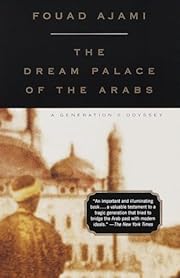

Click on a thumbnail to go to Google Books.
|
Loading... Dream Palace of the Arabs: A Generation's Odysseyby Fouad Ajami
 No current Talk conversations about this book. no reviews | add a review
From Fouad Ajami, an acclaimed author and chronicler of Arab politics, comes a compelling account of how a generation of Arab intellectuals tried to introduce cultural renewals in their homelands through the forces of modernity and secularism. Ultimately, they came to face disappointment, exile, and, on occasion, death. Brilliantly weaving together the strands of a tumultuous century in Arab political thought, history, and poetry, Ajami takes us from the ruins of Beirut's once glittering metropolis to the land of Egypt, where struggle rages between a modernist impulse and an Islamist insurgency, from Nasser's pan-Arab nationalist ambitions to the emergence of an uneasy Pax Americana in Arab lands, from the triumphalism of the Gulf War to the continuing anguished debate over the Israeli-Palestinian peace accords. For anyone who seeks to understand the Middle East, here is an insider's unflinching analysis of the collision between intellectual life and political realities in the Arab world today. No library descriptions found. |
Current DiscussionsNonePopular covers
 Google Books — Loading... Google Books — Loading...GenresMelvil Decimal System (DDC)956.04History & geography History of Asia Middle East (Near East) Middle East 1945-1980; 20th CenturyLC ClassificationRatingAverage: (3.62) (3.62)
Is this you?Become a LibraryThing Author. |
||||||||||||||||||||||||||||||||||||||||||||||||||||||||||||||||||||||||||||||||||||||||||||||||||||||||||||||||||||||||
Ajami seeks to show how the Arab world, while interconnected, is much more segmented than the average Westerner might suppose. The generation of the title is that generation which came of age just after World War II. The central theme of the book is the aborted and probably doomed attempts by the intellectuals of that generation to create more modern, secularized societies. In his survey, Ajami focuses in turn on the downward spiral of violence that wracked Lebanon in the 70s and 80s, events in Egypt through the Nasser, Sadat and (the first two decades of) Mubarak eras, the overthrow of the Shah of Iran and establishment of a Moslem state and the resistance among intellectuals throughout the Arab world to any compromise peace with Israel.
Fascinating stuff, and I learned a lot, especially as I was reading the section on Egypt as the Egyptian people were in the streets changing their political world. Also interesting is that in many cases, Ajami makes liberal use of the words and views of the various regions' most prominent poets in describing the views of those societies. (